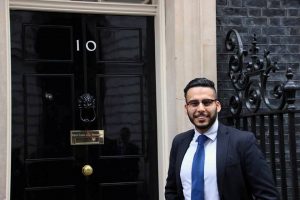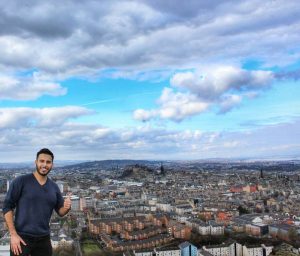“I grew up in the ‘belly of the beast’ in that old apartment complex right across the street. I was not the best student; I frankly didn’t care, but what I did have was music, and it changed my life. While the sound of gun shots and the smell of drugs pierced our one-bedroom apartment window, the guitar gave me a new window to the world; one where I could dream.”
This past week, I returned to Zamboni Middle School in Paramount, my alma mater, to speak to a class of sixth graders about where I had come from and, most importantly, where I had been since I left. While statistically I was set up to be another young man of color who would end up either trapped in poverty, in prison, or dead, I, along with others who attended Zamboni, upset the setup. Among many of our saving graces were our teachers and school administrators who cared deeply and gifted us with unconditional encouragement to dream big.
My journey since growing up in Paramount has been rooted in that quintessential activity: dreaming. While it may be obvious to some, for those born into poverty or a world that barricades opportunity, all we often have is the ability to dream of what may lay beyond. In middle school, it was simple: get a job and provide for my family. In high school it was attend a community college while pursuing a career as a musician. Later, a UCI Educational Opportunity Program representative, who would later become a mentor, Rudy Santacruz, dared us to boldly dream of attending a university like UC Irvine. While at UCI, the barricades were knocked down and I embarked on journeys that I never would’ve imagined possible: leading student organizations, managing community initiatives, studying abroad, working summers in Washington, D.C., teaching English in Colombia on a Fulbright scholarship, policymaking in Sacramento as a California Senate Fellow, and, most recently, pursuing graduate school in the United Kingdom as a Marshall Scholar.
Over the past year, my journey in Bristol has refueled my courage to dream. Every morning as I walk up the steep hills to reach Wills Memorial Hall to spend an entire day writing and reading, the hallmark British cold breeze that hits my face and the Bristolian seagull screams above are a reminder that this is not a dream; it’s my reality. The in-depth conversations with professors, fellow Marshall Scholars, and classmates have enriched my world vision and my role in it.
While in Bristol, I have worked tirelessly to research education policy and practices globally that uplift children from poverty and give them an opportunity to boldly go where their dreams go. At the same time, I worked on the core team to reelect Bristol’s first elected Mayor, George Ferguson. Through these experiences I have dissected local governance, politics, and city structures to understand how to help those most in need. Working in the Mayoral election gave me insight into the quirky, intellectually-stimulating, and passionate bubble that is local British politics (Editor’s Note: Ferguson was ultimately not reelected). This experience unearthed another passion of mine, listening to and collecting inspiring stories of people who go from struggle to triumph. What resonated most with me were the stories of recently arrived Somali families striving to gain a foothold in a new, fast-paced British city in the midst of increasing Islamaphobia and social inequalities. The resilience, creativity, and ambition of Bristol’s immigrant community reminded me of families in my childhood apartment complex in Paramount. When I spoke to the children, they reminded me of myself as a kid; struggling to grasp the ever-changing surroundings yet remaining excited, curious and hopeful.
These experiences have inspired my master’s dissertation. In partnership with Improve Your Tomorrow (IYT) and Valley High School in Elk Grove, California, my graduate work has centered around developing a ten-week summer program called I am Me: Strong, Capable, & Peaceful that seeks to break poverty’s psychological trap and reduce the impact of trauma induced by structural violence on a child’s sense of identity and self-efficacy.
As a kid, the chronic stress I underwent as a result of violence continually eroded my courage to dream, but music provided me with the will to fight back. Similarly, the IYT program has noted that some young men of color who undergo chronic stress and trauma as a result of violence exhibit PTSD symptoms which wear away their self-efficacy to achieve their academic and life aspirations. In essence, these violent experiences construct psychological and physical barricades that appear insurmountable.
The ultimate aim of the intervention is to restore humanity and critical consciousness to the learning process while equipping the young men with mindfulness and coping strategies. The hypothesis is that, via a culturally-tailored curriculum, students may strengthen ethnic and social self-esteem and self-efficacy to help buffer against the effects of traumatic experiences brought on by violence. As historically-marginalized communities continue to experience segregation by income and ethnicity, political marginalization, and increasing violence, I am Me seeks to empower youths to resist and eventually reform these sources of violence and marginalization. To deconstruct or abolish the oppressive institutions and process that continue to marginalize so many, we must heal from within: decolonize the mind and the soul of a child to empower them to recognize and pave their paths towards freedom.
As I drive through the community where I came from, I realize that my graduate work is also a return. My first year as a Marshall scholar has been a personal journey to deconstruct my past and use it to develop ways to support children to have the courage to dream. As I look back at our family’s one-bedroom apartment, I say to the kid who spent hours with an old busted guitar in hand; keep dreaming and playing, your stage awaits.



